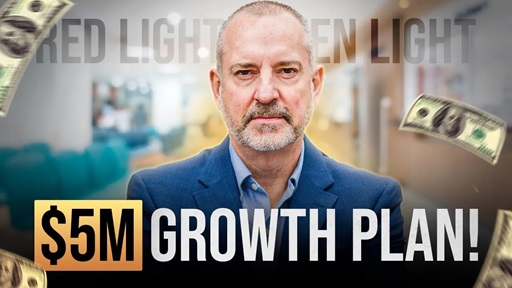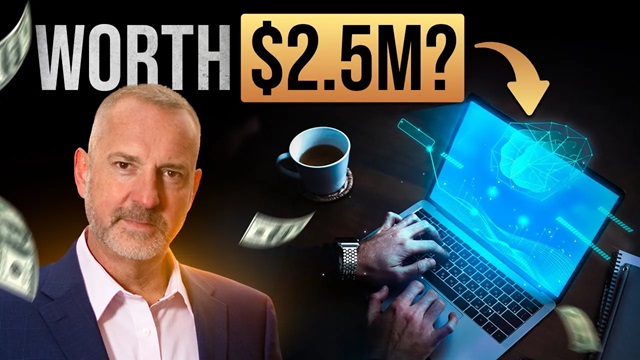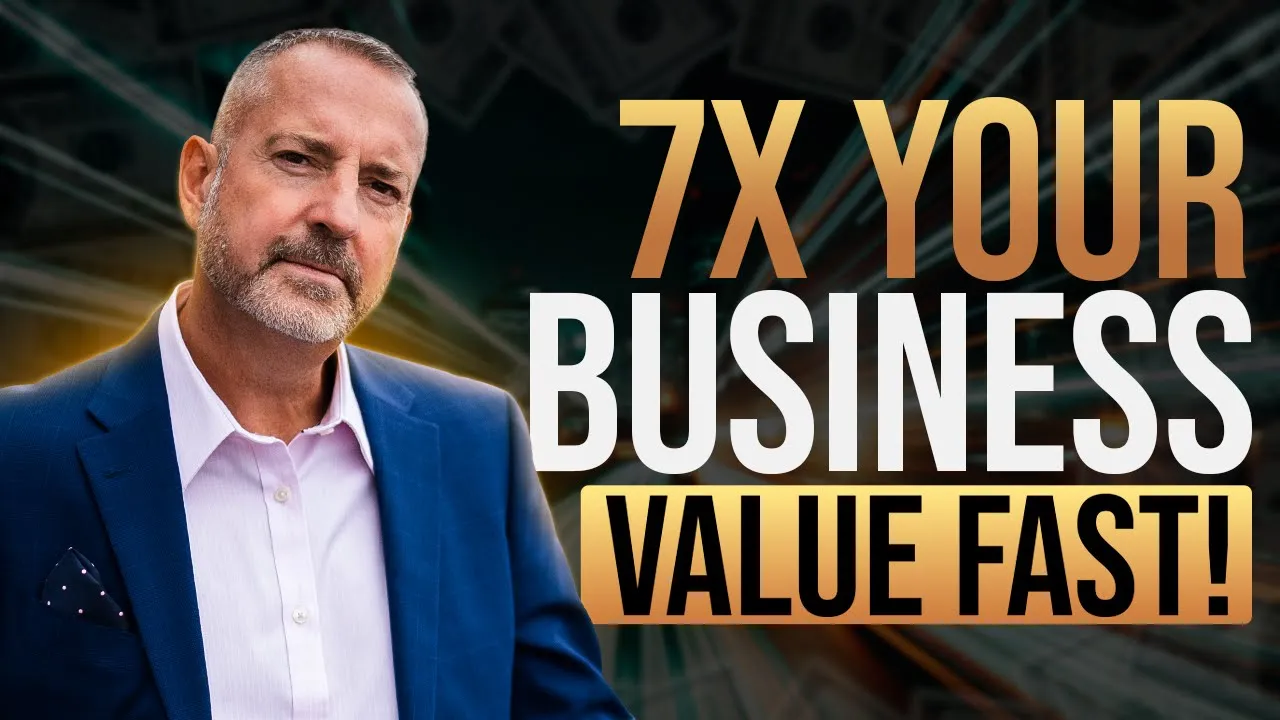Why $3 Million in Profit is Worthless
Why $3 Million in Profit is Worthless
Carl Allen, an expert dealmaker and founder of Dealmaker Wealth Society, shares a fascinating deep dive into business valuation and readiness through a captivating story of his latest deal negotiation. Known for his expertise in buying, scaling, and selling businesses, Carl emphasizes that a business’s value extends far beyond its financial numbers.
In this narrative, Carl recounts his experience analyzing a seemingly lucrative UK-based engineering and fabrication business generating £20 million in revenue and £3 million in EBITDA. Initially, the business appeared highly attractive, boasting high revenue, a solid customer base, and an owner eager to retire. However, upon closer examination, significant red flags emerged. The business was dangerously reliant on a single customer, contributing 75% of its revenue, with no formal contract in place. Additionally, the owner, who managed everything himself, was set to retire alongside his key client. The lack of operational systems, staff empowerment, and diversification rendered the business essentially unsellable.
Rather than walking away, Carl proposed a creative solution: a consulting-for-equity partnership. He offered to dedicate one day a week for two years to transform the business. His plan included diversifying the customer base, implementing contracts, restructuring the team with a new general manager, and establishing robust systems and KPIs. The deal set a current valuation of £2 million, and Carl negotiated a future equity share. If the business sells for £20 million after the transformation, Carl would earn a third of the increased valuation—an estimated £6 million for his efforts.
This story underscores Carl’s belief that business value is not just about profitability but also transferability. Businesses that lack operational independence, have excessive customer concentration, or rely too heavily on their owners cannot realize their true market value without significant transformation. Carl highlights that a buyer must consider customer and employee capital, operational systems, and the seller’s motivations when assessing a business’s readiness and attractiveness.
Through his expertise, Carl demonstrates how creative deal structures can unlock immense potential in underperforming businesses. He reinforces the importance of not only identifying problems but also devising strategic solutions to create value for both buyers and sellers.
Full Transcript:
I wanna talk to you about valuation when it comes to the readiness and the attractiveness of a business. Dealmakers, what’s up?
My vision is to completely and utterly disrupt the market for buying and selling small businesses all over the world. Hey, guys. Karl Allen. Not going to Starbucks, this morning.
It’s a Friday. I’ll be going to Starbucks on the way back. I’m actually going to a, a meeting of a charity that I’m a trustee of. I’m also the treasurer of this charity.
So clearly being a deal maker, I’ve got a lot of financial chops, and I am the treasurer of this, of this charity. So I’m going to have a meeting with my fellow, trustees.
And it’s I I love doing stuff like this. Right? So I’m actually not working today, so I’m doing this, this charity stuff. And as a deal maker, as the owner of twenty different companies on three different continents with managers in those businesses that operate for me, I don’t have to work every single day if if I don’t want to.
I typically do that because I absolutely love and adore my coaching business Dealmaker Wealth Society. I love and adore my client, an equity firm, Kington Deals. I absolutely love and adore most of my businesses. Couple of my businesses, really kind of getting on my nerves at the moment.
So I’m, contemplating, exiting them. And, because I have tons and tons and tons of other deals that I’m looking at right now. And, yeah, I twenty twenty five businesses, really.
I want to be my my limit. Anyway, there’s a couple of things that I wanna talk to you about today. So I wanna talk to you about kind of valuation, not mathematically, but I wanna talk to you about valuation when it comes to the readiness and the attractiveness of a business. So I’m looking at this deal with one of my business partners right now, and it’s on paper.
It’s an absolutely fantastic business. It’s doing it’s a UK business, not too far from where I live actually in Lancashire. It’s doing, twenty million pounds of more in revenue, and it’s doing three million pounds in EBITDA. Right?
So that’s about three point eight four million US dollars at the moment. Right? So massive business. And it’s in the engineering space, so it’s like a fabrication company, steel engineering fabrication company.
So really cool business, two owners, one guy owns like eighty percent, the other guy owns like twenty percent. So really cool business and, you know, has a lot of great clients like Rolls Royce, Jacky of Land Rover, UK Ministry of Defense, like, phenomenal.
So looking at this deal, and obviously as a deal maker, you go and you have a meeting. So I had a meeting with the owner. He and I support the same, soccer team, the same football team. So probably the easiest time I’ve ever had it building rapport.
Because I have a photographic memory. I can remember every soccer game of YT Berlin. I can remember, all the players, the goals they scored, all the memorable dates. So literally, I’m I spent the first thirty to forty minutes that meeting just just talking about Burnley, which was absolutely amazing.
So this guy is like my my best buddy at this point. So then we get into the the kind of the business conversations. We’re talking about the business and it’s grown and, there’s different kind of subsidiaries that are part of it as well. So I walked away from that meeting thinking, wow.
This is a great business.
It’s it’s got, an absolute boatload of cash flow. It’s got an absolute boatload of assets. It’s got blue chip customers. It’s got a great owner that wants to retire, and it looks like he’s running a really cool ship.
I’m really interested in this deal, and and he told me in the meeting, I will be very creative and flexible with you in terms of of the deal structure, in terms of the payments. So I’m like, wow. Okay. This this is a this is a green line. We’re we’re gonna go ahead. So then I started to do my due diligence.
So I got the financials, I got the business plan, I got the org charts, and I went through and the whole thing then started to ramble. So the first thing that I noticed is seventy five percent of the turnover of this business, the revenue of this business comes from one customer. Right? One customer. Seventy five percent. That’s like suicide.
Not only that, when I asked to see the contract, he said, I’d have a contract. He’s like my best friend. Alarm bells, red flags, like my best friend. Still a contract, just a handshake.
It’s the guy I have a drinky with, two, three times a week. And he said, hey, he’s looking to retire at the same time. So we’re actually, you know, he’s gonna sell his business, I’m gonna sell my business, and we’re gonna go off and retire. We’re gonna buy houses on the same golf course of Portugal, and we’re gonna be good.
And I’m thinking, well, hang on a minute. Right? Seventy five percent of the alternative was with Walkers, but no contract. He’s your best friend, and he’s also gonna retire at the same time that you are.
He’s about to sell his business. So if I buy your business, however much I value it and structure the deal, he sells his business.
Your business, which is then gonna be my business and that his business, which he sold to somebody else, is not gonna have a commercial relationship. There’s nothing to stop that customer going and using somebody else. So that was a massive problem.
The second biggest problem that he said to me, he’s like, hey. I’m I’m about to fire my GM.
He’s not did a very good job. He’s useless. In fact, all the people in the business are not very good.
I only wish they were better than me. I do all the selling.
I run all the operations. I am the business. I’m working sixty hours a week. I’m literally chained to this business. Now, as a seller, you shouldn’t really say things like that, not to a buyer or to a savvy buyer like me and a savvy buyer like you if you keep watching those videos. Because I think you well, if he leaves this business, I’m gonna lose seventy five percent of my revenue.
Why?
I’ve got nobody to run the business, but you’re telling me that everybody else that works there is useless.
And, like, this this business, I can’t buy it. There’s no way I could buy this business. So he he said to me, he called me up, he said, right. Bit through the numbers.
How much is this business worth?
I said, honestly? Yeah.
Zero. He’s like, how can that be?
I’ve got three million pounds worth of EBITDA. And I spoke to my accountant, and my accountant said a business like this would normally trade for around a six times multiple. So we’re looking at about eighteen million pounds. Plus I have a couple of million pounds of surplus cash in bank. So it’s a twenty million pound deal. Right? And and give me ten upfront, and I’ll take ten over five years.
This thing’s making three million a year. You said you’re gonna grow it, so you can afford to pay me two million a year and still make a million pounds a year with with Toyota. I’m like, dude, I record dude from White Mate. This business has no value because if you walk away, this business evaporates.
There’s absolutely no way that you could sell this business. No one’s gonna buy this business. Not even a trade buyer, private equity firm, somebody like me. I am a private.
No one’s gonna buy this business. I’m not putting any of my capital into this business and I don’t want any of my partners to put any of their capital in this business, this business is at work.
So this guy is now like practically suicidal. He’s like, what the hell? Like really? We said, yeah.
And then he said something really cool to me, he said, well, help me fix it. I’m like, dude, I I bike up in this, I’m not a turnaround. I I like to bike businesses that are like polished, and then I can make them even better. I wanna buy a business where I’m not inheriting any headaches.
He said, well, buy and I’ll stay.
I said, that’s burned to me before you buy a business, the seller stays in the business, and then as soon as they get their money, they’re gone.
They’re gone like a puff of smoke. You never see them again, because they’ve no incentive to stay because they got their money. So I said to him, look, I’ll tell you what I’ll do. Alright?
I’m gonna put an an arbitrary two million pound valuation on this business today, and that’s generous. Right? Out of this business is worth anything. But let’s say it’s worth the value of the severance cash, two million.
Right?
Unless you and I work together. Right? I will come and work with you. I’ll spend a day a week working in the business with you. We’re gonna develop systems. We’re gonna develop processes.
We’re gonna do some bolt on acquisitions.
We’re gonna diversify you away from your largest customer. We’re gonna have him put a contract in place before he sells just to protect us. We’re gonna go and find and train and onboard and incentivize a new general manager. We’re gonna go and switch accounting firms, but his accounting records were, like, awful. And absolutely nothing in this business was documented.
There was no operating system running the business.
They they didn’t have meetings.
There was no SOPs. There was no standards. There was no no KPIs.
There was nothing. Right? So I said, I’m gonna put all this in place, everything.
And then what I’m gonna do is I’m gonna come in as a consulting for equity partner. If you don’t know what that is, it’s basically, I I have an option in the future to acquire a certain percentage of business.
So so so what we did is we set a two million pound valuation and I said, I’ll I’ll work with you for two years in this business, Gus, and in two years we’re gonna sell it, we’re gonna sell it together.
Right? And when we sell it in two years, whatever we sell for, less the two million pound effectively the strike valuation, the valuation now. So if we sell it for twenty million in two years, which is what I think we can do, Less the two million valuation now at eighteen million dollar gap, I want half of it. And it’s like, no way. Absolutely no way. So anyway, we settled on a third.
So I’m gonna own a third of this thing above the two million, and he’s gonna owe two thirds of it above the two million. And then we’re gonna allow fifty percent or so for a c suite to come in, and that’s gonna come out of his portion.
So if all goes to plan, I’ll make six million pounds working a day a week, for two years on this business.
But it’s not really my time that he’s paid for. It’s my value and it’s my skills. It’s my expertise of crooning and coding and policy businesses, bolting in other businesses into the and making it extremely broad value. So just wanted to say that story that just because the business is profitable on paper, it’s only that value is only real if you can transfer it and monetize it.
The business is attractive ready to sell. If it’s got customer concentration, if it’s got no barriers to entry, the records are in a mess. If there’s nobody to do the work of the owner when they leave, if the owner is the business, not the owner of the business, then you you really can’t buy it without getting extremely creative. Like one of the other ways I look to do this deal is that one, I just give him the surplus cash, he walks away, and then I just pay him and earn him.
He wouldn’t have gone from that by the way, but then it’s like I you know what? I don’t really like them out of this business. So I’ve gotta go find somebody, and train them and onboard them. And I end up spending so much time in that thing and I don’t do that. So spending a day a week in there for two years is easy. I’ll do Fridays. I don’t work on Fridays.
So I do now. Friday’s gonna be my, my big deal day. Gonna go and sit in that business and, get it up to five two way and make it very, very sellable.
I might even buy it in the future, because once it’s got transferable value, there’s trillions of dollars of capital out there that I could use to to buy it. But I think if I can get into twenty million valuation, I’ll just sell it, with him and make six million, and then that’ll be awesome. Alright, guys. I hope you found it useful. I’m almost at my meeting. I will see you guys soon on the next video. Until then, bye for now.




